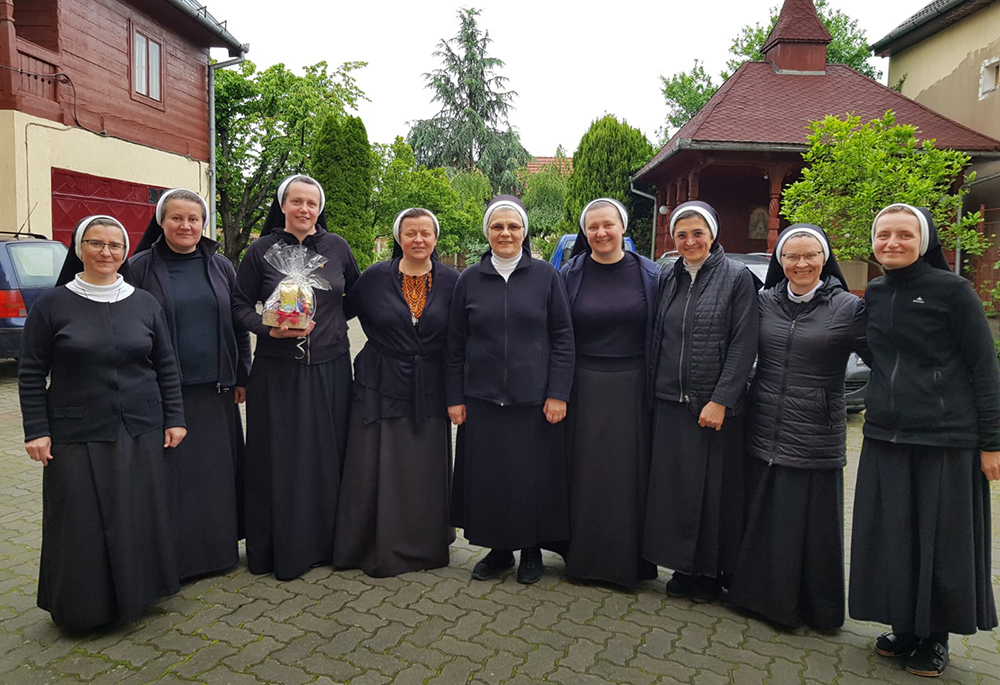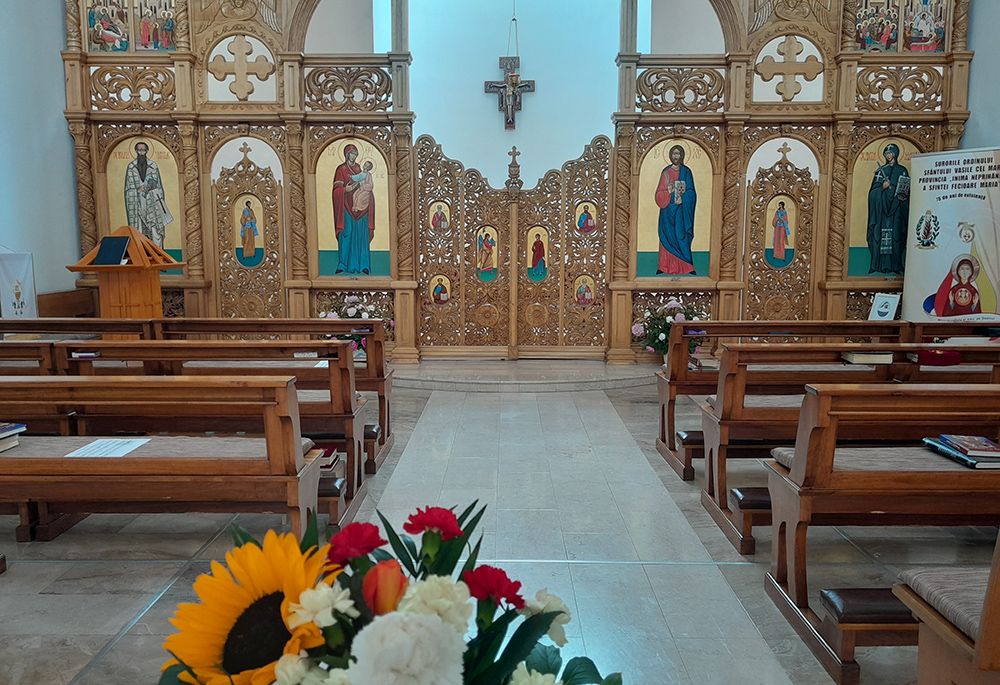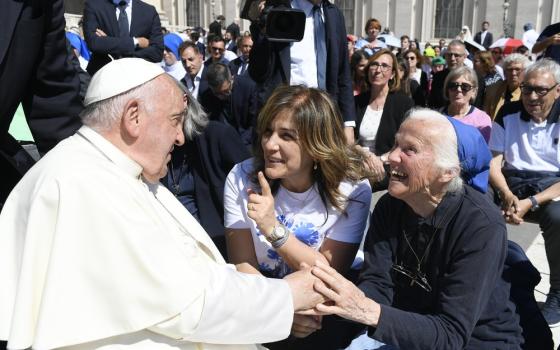
Sr. Teodozija Myroslava Mostepaniuk is pictured in a photo taken in May 2023 at Cheile Turzii ("The Keys of Turda") canyon in Romania. (Courtesy of the Sisters of the Order of St. Basil the Great)
Traveling has never been my passion. Nevertheless, I have lived most of my religious life outside my Ukrainian homeland and have had the opportunity to get to know other peoples, languages, and cultures in Croatia, Bosnia and Italy. In May 2023 I had a wonderful opportunity to spend a month with the Basilian Sisters of the Province of the Immaculate Heart of Mary in Romania — a blessing and an enrichment, culturally and spiritually.
Even in religious life, we talk a lot about interculturality. The cultural diversity of the membership is often a challenge for the administration of the religious congregations. But lived with acceptance and consciousness, cultural diversity can also become a gift for the community. I learned this in Romania!
The Basilian Sisters minister in Europe, North and South America, and Australia. The Province of Romania is one of the youngest provinces of our order in terms of the age of the members. Our general administration encourages us to have experiences in other provinces, to build better interpersonal connections and to exchange our experience of ministry. Thus I found myself in Romania, where 37 sisters live in monasteries in the Romanian cities of Cluj-Napoca, Gherla, Baia-Mare, and Lugoj. Like the entire Greek Catholic Church of Romania, the sisters survived the difficult times of communism, persevering in their vocation and passing on the tradition of religious life to the next generation.
My stay in Romania began with getting to know the St. Ann kindergarten in the city of Cluj-Napoca. Each child is greeted with a warm smile in the morning, and — even at the entrance — kids confidently share with their teachers the events of the previous day, or childhood joys and sorrows. How much attention, patience and love are needed to help these little personalities grow!
Before the midday nap, children of the middle group were sitting in a circle with their teacher Sister Maximiliana and singing songs with movements. One song was about Jesus, who walked on water and healed with his touch. Since it was my first day and I did not understand Romanian at all, I did not manage to do the movements in time: touch the neighbor on the left, then the right. "Аtinge-ma/Touch me!" — said a little boy, pushing me from the side. These words became the summary of my stay in the Romanian Province of the Basilian Sisters. "Touch me!" — an invitation to us religious, from God and humanity, to touch the lives of others, to discover the new and the unknown.
In the kindergarten I also saw the healing power of words and acceptance. Sometimes children come in upset, burdened by the experiences of what happened at home. If the children cannot cope with their emotions, the educator helps them to understand what exactly they are experiencing right now: fear, anger or sorrow? The teacher kindly instructs them how to understand, name feelings and express them without harming themselves or others.

Basilian Sisters from Ukraine and Romania, pictured May 2023 in Cluj-Napoca, Romania (Courtesy of the Sisters of the Order of St. Basil the Great)
Sure, this may seem like a small thing, but I was impressed by these small victories every day here in the kindergarten, which will undoubtedly have a strong impact on the future lives of these children. I thought about how important it is for us, in monastic life or in human life in general, to be able to confess: "I'm sad," "I'm angry," or "I'm tired." To confess and to live it through, without breaking things and other people's hearts.
In Romania we also provide medical care. One day I had the opportunity to accompany a sister in visiting the sick. What could be a difficult experience turned into a mystical and profound episode. In the city of Gherla, it was about to rain: Black clouds were on the horizon, and white blossoms were falling from the trees like snow. Sister Andreea and I drove into a poor part of town.
Here, in a small room, I met a woman and her husband, who had survived an accident. From the photo on the shelf, I realized that he had been a musician. Now he could barely move his fingers. Sister Andreea bandaged his wounds, and the eyes of the man who could not speak, glowed with gratitude. The next patient was an old woman. Because of mental disease she didn't quite understand what was happening, so she was as worried about the medical treatment as a little child.
Her daughter calmed her — holding her mother's hand as she would a child. Bandaging the woman's wounds, Sister Andreea tenderly called her "iubita" ("dear"). Before leaving, I noticed the granny, whose pain had subsided, sitting silently near the window and looking at the rain for a long time.
As Sister Andreea and I drove back to the monastery through a thunderstorm, I felt that all of the events of that day were the parts of one whole: the spring flourishing of trees, black storm clouds, human wounds, dreams cut short by illness or misfortune, the vulnerability of childhood and old age: All need so many hugs, words, presence and touches.
I was able to encounter the history of Romania as well. On the second Saturday in May I participated in the annual pilgrimage of Romanian Greek Catholics to the city of Sighetu, where seven Greek Catholic bishops were martyred during communism. After more than 40 years of underground existence, the Romanian Greek Catholic Church was legalized in 1989 and today — 34 years later — the archdiocese includes five dioceses in Romania and one diocese in America.

Chapel of St. Macrina Monastery of the Basilian Sisters in Romania, May 2023 in Cluj-Napoca (Courtesy of the Sisters of the Order of St. Basil the Great)
Every year, the faithful gather in Sighetu as a sign of the Romanian Greek Catholic Church that "resurrected" when it seemed that there was no hope for restoration. The former prison in Sighetu was transformed into a memorial to the victims of communism. Now the walls of this museum are covered with photos of people who were imprisoned here: men, women, elders, young people, priests, and artists. ... In one image in the darkness of a cell, only shackles were visible, with light emanating from them.
Sighetu is located at the very border of Ukraine. In the center of the city there is a monument to Ukrainian poet Taras Shevchenko and the Ukrainian Lyceum. The bishop noted at the liturgy: "Here, across the Tysa River, there is a war and people are dying." Yes, again and again, just across the river, my people are threatened and abused by the Russian aggressor every day. Even during the pilgrimage and liturgy here in Sighetu, a few kilometers away an air raid siren may sound.
On the way to Sighetu the sisters sang the rosary to the merciful Jesus; the melody of the prayer flowed so organically into these green mountain slopes, the landscapes that opened before our eyes through the window of the minibus. "Prin patimirea Sa dureroasă, ai milă de noi şi de mulă lumea." ("For the sake of His sorrowful Passion, have mercy on us and on the whole world.") These words poured over the Romanian land, and I thought that this may be part of our religious vocation: to be the voice and lips that say a prayer and invoke God's mercy on this world.
Advertisement
I am sincerely grateful to the Romanian Basilian Sisters for their openness and willingness to accept me, a person from another culture, into their daily life, prayer, work and common life. I thank God for touching me through the Romanian spring, the liturgy, the directness of children and the friendliness of adults.
Of course, the experience of interculturality also included experiencing my own weakness, limitations, and the need to accept help. You may feel competent in your own language environment, but in the same work in another language you become a beginner. Sometimes another language sounds like music, and sometimes staying in a foreign language environment is tiring. Despite these difficulties, it is always worthwhile to walk in another culture.
Romania taught me that there are whole worlds nearby, where God reveals himself in a different language, in a way of prayer, in the lives of people who love, hope, and dream. Can't you hear? They invite you: "Аtinge-ma/Touch me!"





